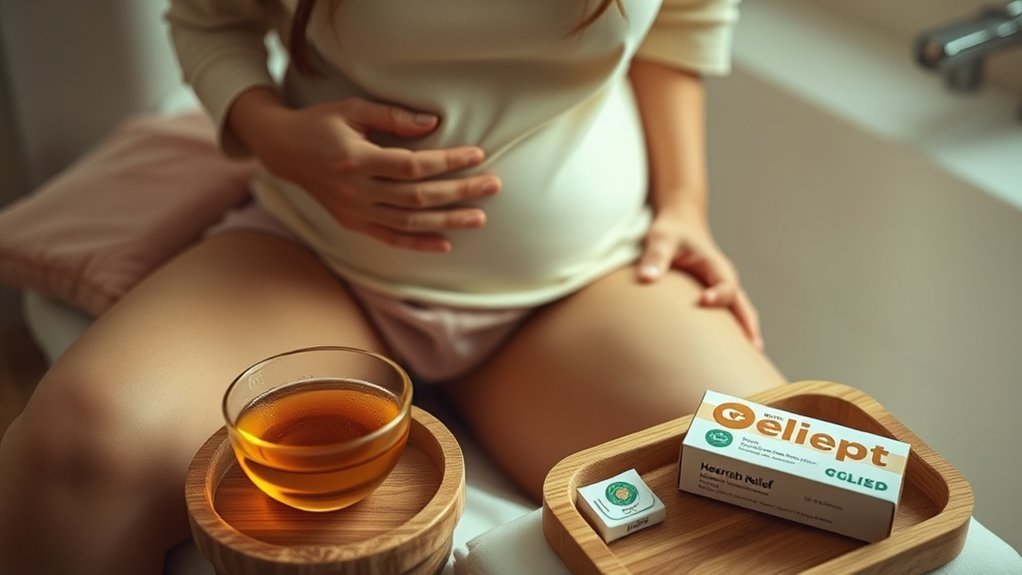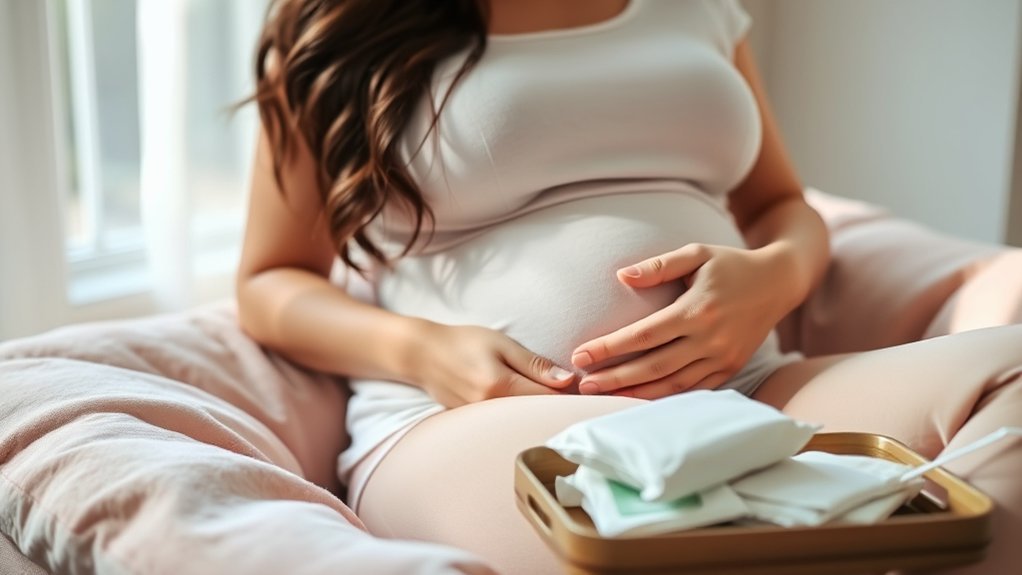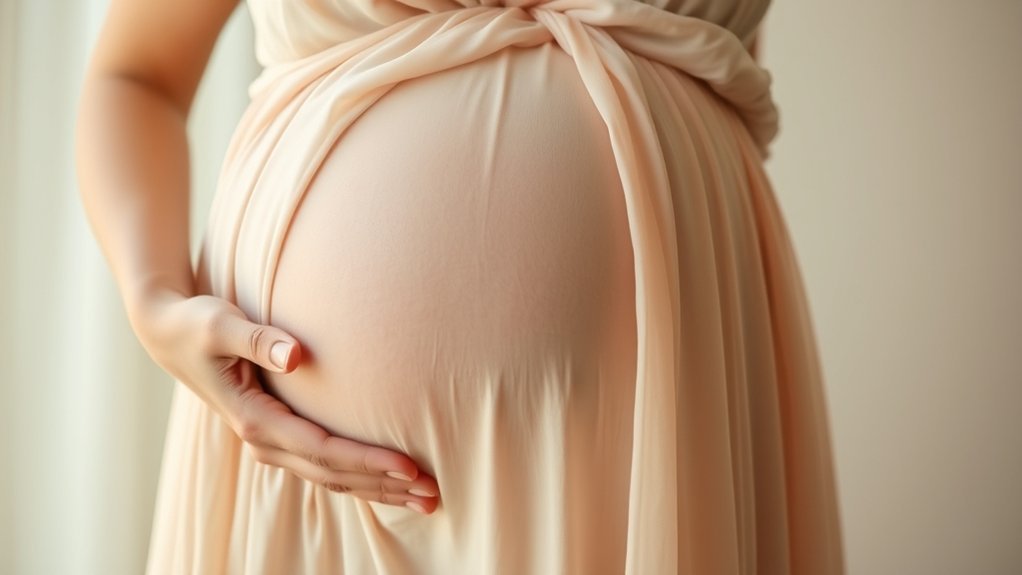After giving birth, many new mothers experience postpartum hemorrhoids, which can be both painful and frustrating. Understanding the causes and symptoms is essential for effective management. Fortunately, there are several home treatment options and lifestyle changes that can provide relief. However, if symptoms persist or worsen, it’s important to know when to seek medical help. Let’s explore the various strategies to alleviate discomfort and promote recovery during this challenging time.
What Are Postpartum Hemorrhoids?

Postpartum hemorrhoids are a common issue that many women face after giving birth. These swollen veins in the anal area can affect about 40% of new mothers, presenting various symptoms such as pain, itching, and discomfort during bowel movements.
You might notice blood in your stool or experience considerable discomfort soon after delivery or within days. Increased pressure from your growing fetus during pregnancy, along with straining during labor, greatly contributes to their development.
While most postpartum hemorrhoids resolve on their own within six to 12 weeks, treatments are available to alleviate discomfort in the meantime. It’s crucial to address these symptoms promptly to improve your overall comfort during recovery. Prenatal care can play a significant role in preparing your body for the changes and challenges of postpartum recovery.
What Causes Postpartum Hemorrhoids?
Postpartum hemorrhoids often arise from the increased pressure on pelvic veins during pregnancy and childbirth. Hormonal changes can lead to constipation, making it harder to avoid straining during bowel movements. Understanding these factors can help you manage and prevent the discomfort associated with hemorrhoids after delivery. Additionally, children’s health and nutrition programs are crucial in supporting mothers and families during the postpartum period.
Increased Pelvic Pressure
As your body adjusts after delivery, you might find that increased pelvic pressure plays a significant role in the development of hemorrhoids.
During pregnancy, the growing baby places extra weight on your pelvic veins, leading to swelling in the rectal area. This condition affects around 43% of women due to both the fetus and hormonal changes that relax blood vessel walls.
Constipation can further worsen pelvic pressure, making bowel movements uncomfortable and increasing the likelihood of hemorrhoids. Additionally, prolonged sitting or straining during these movements elevates the risk.
After labor, the pressure from pushing can exacerbate existing hemorrhoids, making postpartum women particularly vulnerable.
Understanding these factors can help you find effective relief strategies.
Hormonal Changes Impact
While your body undergoes significant changes after giving birth, hormonal fluctuations play an important role in the development of hemorrhoids. Increased progesterone during pregnancy relaxes blood vessels, making the veins in your rectum and anus more prone to swelling.
Additionally, the growing uterus and increased blood volume exert pressure on the pelvic veins, which can hinder blood return. This combination creates a perfect storm for hemorrhoids, especially during the postpartum period.
Many pregnant women also face constipation during pregnancy, which adds to the pressure on the veins when straining during bowel movements.
With up to 43% of women experiencing hemorrhoids in late pregnancy or shortly after childbirth, understanding these hormonal changes is crucial for managing your recovery effectively.
Constipation Factors
Hormonal changes after childbirth can lead to several factors that contribute to constipation, a significant cause of postpartum hemorrhoids. As your body adjusts post-delivery, decreased physical activity, pain medication, and dehydration may exacerbate constipation.
Additionally, the fear of pain from hemorrhoids or an episiotomy can make you hesitant to push during bowel movements. The pressure from the growing fetus during pregnancy can also lead to swollen veins, increasing the risk of hemorrhoids.
To alleviate constipation, consider incorporating a high-fiber diet and staying hydrated. You might also find relief through stool softeners, which can ease your bowel movements and reduce the discomfort associated with hemorrhoids.
Managing these factors is essential for postpartum recovery and comfort.
Symptoms of Postpartum Hemorrhoids
After childbirth, you might notice symptoms of postpartum hemorrhoids, including pain and discomfort in the anal area.
Many women also experience itchiness and sensitive lumps, along with bleeding during bowel movements.
It’s important to recognize these signs, as they can greatly impact your comfort and recovery.
Common Symptoms Experienced
Postpartum hemorrhoids often cause a range of uncomfortable symptoms that can greatly impact your daily life.
You might experience various issues around the anus, which can be distressing. Common symptoms include:
- Pain during bowel movements and while sitting
- Itchiness and irritation around the anal area
- Bleeding during bowel movements, which can be alarming but is generally not a sign of a serious condition
These symptoms can vary depending on whether you have internal or external hemorrhoids.
Sensitive lumps or swelling near the anus may indicate external hemorrhoids, often tender to touch.
Recognizing these symptoms is essential for seeking effective treatment and finding relief.
Don’t hesitate to consult a healthcare professional for guidance and support.
Pain and Discomfort
Experiencing pain and discomfort in the anal area is a common reality for many new mothers dealing with hemorrhoids. These hemorrhoids can cause significant pain, particularly during bowel movements, making an already challenging postpartum period even harder.
You might also notice itchiness and irritation surrounding the anus, further affecting your quality of life. Sensitive lumps or swelling may be felt, indicating the presence of either internal or external hemorrhoids. Most women start to experience these distressing symptoms within days to weeks after childbirth.
While it can be uncomfortable, know that treatment options are available, and significant improvement typically occurs within six to twelve weeks postpartum. Seeking help can aid in managing pain and restoring comfort during this time.
Bleeding During Bowel Movements
Bleeding during bowel movements is a distressing symptom that many new mothers face when dealing with postpartum hemorrhoids. This bleeding can range from minor streaks on toilet paper to more significant blood in the stool. It’s crucial to monitor the severity of this symptom.
- Minor bleeding is common and usually resolves within weeks.
- Persistent or heavy bleeding should prompt immediate medical attention.
- Hemorrhoids may cause discomfort, leading to changes in bowel habits that can worsen symptoms.
Understanding these factors can help you navigate your recovery. While symptoms often improve as your body heals, don’t hesitate to seek treatment if the bleeding continues, ensuring your comfort and health during this postpartum period.
Home Treatment Options for Postpartum Hemorrhoids

When new mothers face the uncomfortable challenge of hemorrhoids, effective home treatment options can greatly ease discomfort and promote healing. Here are some simple yet effective remedies:
| Treatment | Description |
|---|---|
| Warm Sitz Baths | Soak in a tub for 15 minutes several times daily to relieve discomfort and reduce swelling. |
| Hemorrhoid Cream | Apply over-the-counter hemorrhoid cream for temporary relief from itching and irritation. |
| Witch Hazel Pads | Use pads for soothing relief and to minimize irritation. |
| Stay Hydrated | Drink plenty of water to soften stools and ease pressure on hemorrhoids. |
| Fiber Supplements | Incorporate fiber supplements to help maintain regular bowel movements. |
Maintaining a high-fiber diet is essential for managing conditions like hemorrhoids effectively during the postpartum period.
Dietary Changes to Prevent Constipation
Managing hemorrhoids postpartum often requires addressing underlying issues like constipation, which can exacerbate discomfort. Making specific dietary changes can greatly help. Here are some essential strategies to reflect on:
Managing postpartum hemorrhoids involves tackling constipation through dietary changes for improved comfort and health.
- Incorporate high-fiber foods such as fruits, vegetables, legumes, and whole grains to soften stools.
- Stay hydrated by aiming for at least eight cups of water daily to maintain regular bowel movements.
- Engage in regular physical activity, like light exercise and short walks, to promote digestive health.
Gradually increase your fiber intake to avoid gas and bloating, and consult with your healthcare provider about safe fiber supplements if needed. Additionally, adequate hydration plays a crucial role in preventing constipation and supporting overall digestive health.
When to Seek Medical Advice
How can you tell when it’s time to seek medical advice for postpartum hemorrhoids?
If you’re experiencing severe pain that doesn’t improve with home remedies, it’s important to consult your healthcare provider. Heavy bleeding during bowel movements or significant discomfort that persists despite treatment should never be ignored.
If your hemorrhoid symptoms worsen or don’t improve within a few weeks postpartum, reach out to a professional. They can discuss potential treatment options, including prescription medications or in-office procedures, especially if over-the-counter treatments fail.
Additional Relief Methods for Hemorrhoids

Several effective relief methods can help manage postpartum hemorrhoids and ease discomfort. You can incorporate these strategies into your routine for better relief:
Discover effective relief methods to manage postpartum hemorrhoids and ease discomfort for a smoother recovery.
- Ice packs: Apply an ice pack wrapped in cloth to the anal area for 20 to 30 minutes several times a day to reduce swelling and pain.
- Witch hazel: Use witch hazel applied with cotton balls or pads to alleviate irritation and inflammation around hemorrhoids.
- Sitz baths: Take warm sitz baths for about 15 minutes multiple times daily to soothe the anal area and promote healing.
Additionally, engaging in light exercise, like short walks, can help with regular bowel movements, reducing constipation that may worsen hemorrhoid symptoms.
If discomfort persists, consult your healthcare provider.
How Long Do Postpartum Hemorrhoids Last?
Postpartum hemorrhoids can be a troublesome issue for new mothers, often arising shortly after childbirth. Typically, these hemorrhoids take about six to twelve weeks to resolve on their own, with most improvement occurring within the first two weeks.
Symptoms may appear within one to two days after delivery and can vary in duration based on individual circumstances. Initially, the swelling may seem larger, but you’ll likely notice it shrinking considerably within days.
Many women find relief through home treatments and lifestyle changes, like increasing fiber intake and staying hydrated.
However, if your symptoms persist beyond twelve weeks or worsen, it’s important to consult a healthcare provider for further evaluation and potential treatment options.
Tips for Preventing Postpartum Hemorrhoids
To help prevent hemorrhoids after giving birth, it’s essential to adopt certain lifestyle changes that promote bowel health. Here are some effective tips:
Adopting lifestyle changes is crucial for preventing hemorrhoids postpartum and ensuring better bowel health.
- Incorporate a high-fiber diet rich in fruits, vegetables, and whole grains to soften stools and prevent constipation.
- Stay hydrated by drinking at least eight cups of water daily, especially while breastfeeding, to maintain regular bowel movements.
- Engage in light physical activity, like short walks, to promote digestion and reduce the risk of constipation.
Additionally, avoid prolonged sitting, consider using a hemorrhoid pillow, and practice good toilet habits, such as elevating your feet with a footstool.
These steps can greatly relieve hemorrhoids and enhance your postpartum recovery. Furthermore, connecting with WIC resources can provide additional nutritional support for new mothers to ensure a healthy recovery.
Frequently Asked Questions
How Do You Soothe Hemorrhoids While Pregnant?
To soothe hemorrhoids while pregnant, you should increase your fiber intake, stay hydrated, engage in light exercise, take warm sitz baths, and apply ice packs to reduce swelling and alleviate discomfort effectively.
How to Shrink Hemorrhoids After Pregnancy?
To shrink hemorrhoids after pregnancy, you’ll want to soak in warm water multiple times daily, eat high-fiber foods, apply ice packs, use over-the-counter treatments, and engage in light exercise to promote healing effectively.
How Long Do Postpartum Hemorrhoids Last?
Postpartum hemorrhoids typically last from six to twelve weeks, often improving considerably within two weeks. If your symptoms persist or worsen, it’s important to consult a healthcare provider for evaluation and appropriate treatment options.
When Do Pregnancy Hemorrhoids Go Away?
Pregnancy hemorrhoids usually improve within a few days after delivery, often resolving notably within six to twelve weeks. You can enhance recovery by staying hydrated and making dietary adjustments to ease discomfort and promote healing.
Conclusion
To sum up, managing postpartum hemorrhoids requires a proactive approach to alleviate discomfort and promote healing. By incorporating home remedies, dietary changes, and light exercise into your routine, you can help ease symptoms and prevent future issues. Remember, it’s essential to listen to your body—if your symptoms don’t improve, don’t hesitate to seek medical advice. You’re not alone in this journey; many new mothers face similar challenges, and with the right support, you can get back to feeling like yourself again.
